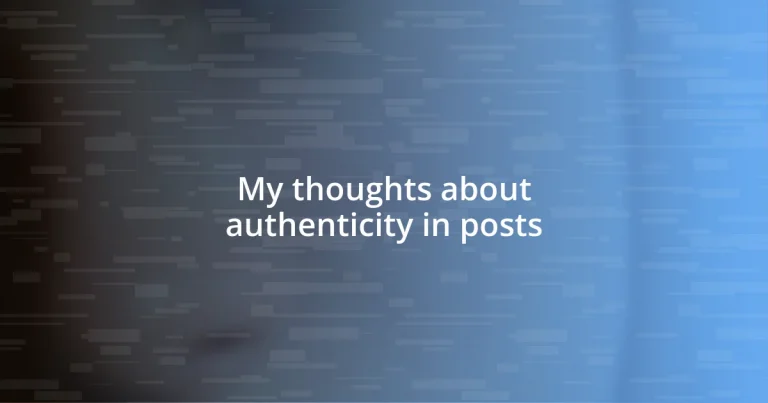Key takeaways:
- Authenticity in content creation fosters deeper connections and trust with the audience through genuine communication and vulnerability.
- Challenges like fear of judgment, comparison, and overthinking can hinder authenticity, requiring creators to embrace their true selves and unique voices.
- Future trends will likely focus on increased transparency, collaborative storytelling, and the use of technology to enhance authentic engagement.
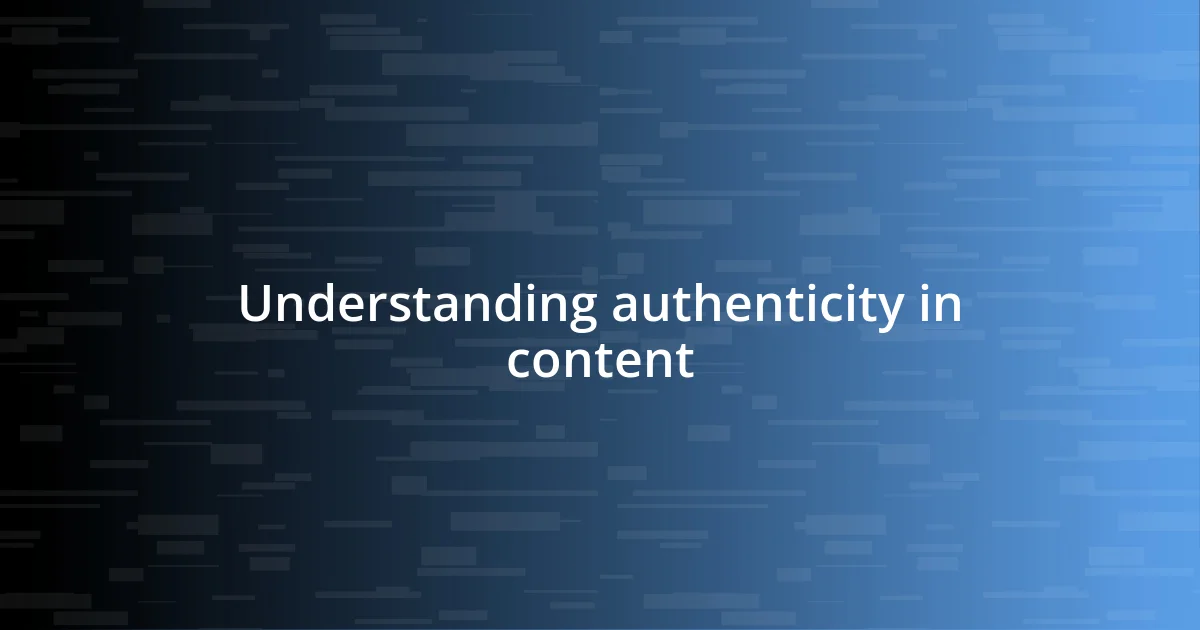
Understanding authenticity in content
Authenticity in content is about being genuine and relatable. I still remember a blog post I read that felt like a conversation with a friend rather than a sales pitch. It made me wonder, have we lost touch with the real voices behind our screens?
When I create content, I strive to infuse my personal experiences and emotions into each piece. One time, I shared a failure that taught me a vital lesson, and the overwhelming response from readers made me realize how much people crave honesty. It’s not just about delivering information; it’s about connecting on a deeper level.
I often think about the trust we build with our audience. When content resonates with our true selves, it fosters a sense of belonging. How can we expect our readers to engage if we don’t show them the real us? Balancing vulnerability with professionalism can be tricky, but it’s this very balance that leads to authentic and impactful content.
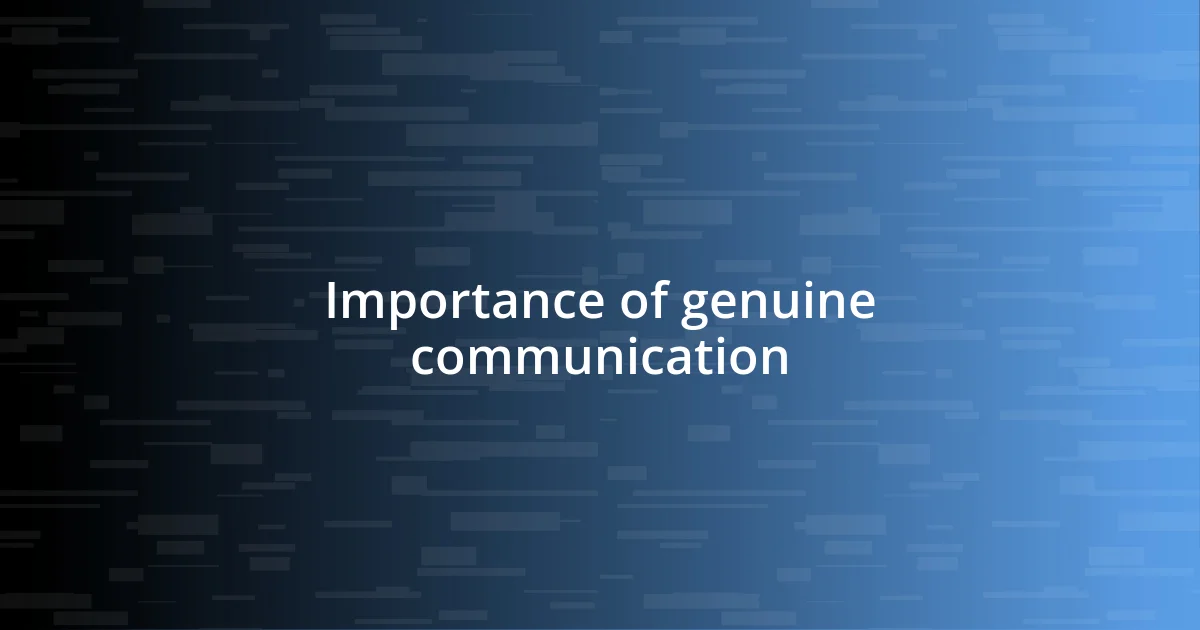
Importance of genuine communication
Genuine communication is crucial in creating lasting connections. I recall a time when I wrote a heartfelt apology to my audience after a misunderstanding on a project. The response was overwhelmingly supportive; people appreciate sincerity. It’s a reminder that genuinely expressing oneself creates a bond that transactional interactions simply can’t match.
When sharing my thoughts online, I prioritize clarity and honesty. Recently, I opened up about my struggles with consistency in content creation. The feedback was touching; readers shared their own battles, making me feel like we were part of a larger community. This connection illustrates how authenticity encourages openness, enriching the dialogue and deepening relationships.
A strategic approach can also be fruitful. While crafting content, I consider the balance between personal anecdotes and professional insights, ensuring there’s value in both. I once integrated a personal story into a case study, which not only made the information relatable but also sparked engagement and discussion. It shows that genuine communication doesn’t diminish professionalism; instead, it elevates it, fostering trust and loyalty.
| Characteristics | Genuine Communication |
|---|---|
| Trust Building | Enhances audience trust through honesty. |
| Connection | Creates a sense of belonging and community. |
| Engagement | Fosters deeper conversations and interaction. |
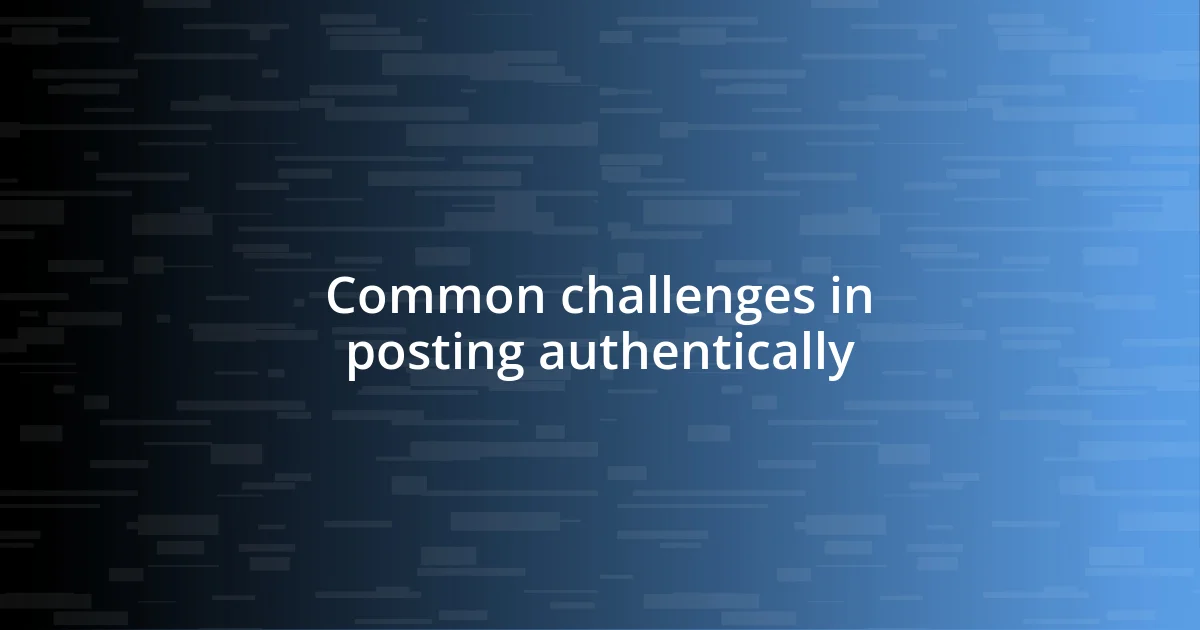
Common challenges in posting authentically
Navigating the world of authentic posting can present several obstacles. One challenge I’ve faced is the pressure to conform to trends or what others deem “successful.” I remember when I tried to emulate a popular content creator’s style—my posts felt forced and inauthentic, which only diminished my voice. This experience taught me that authenticity may require standing out, even when it feels safer to blend in.
Here are some common challenges encountered in the pursuit of authenticity:
- Fear of Judgment: The worry about how my thoughts will be received can stifle my genuine expression.
- Overthinking: I often get lost in trying to craft the perfect message, which can dilute my authenticity.
- Comparison: Seeing others’ seemingly perfect posts can lead me to question my content’s value or originality.
- Vulnerability Hangover: Sharing personal stories sometimes leaves me feeling exposed and anxious about potential backlash.
Finding that sweet spot between being true to myself and being relatable can be a tightrope walk. Each time I share something meaningful, like my journey through burnout, I wonder how it will impact my audience. While sharing vulnerability can be uncomfortable, the conversations that blossom from those moments remind me why authenticity matters.
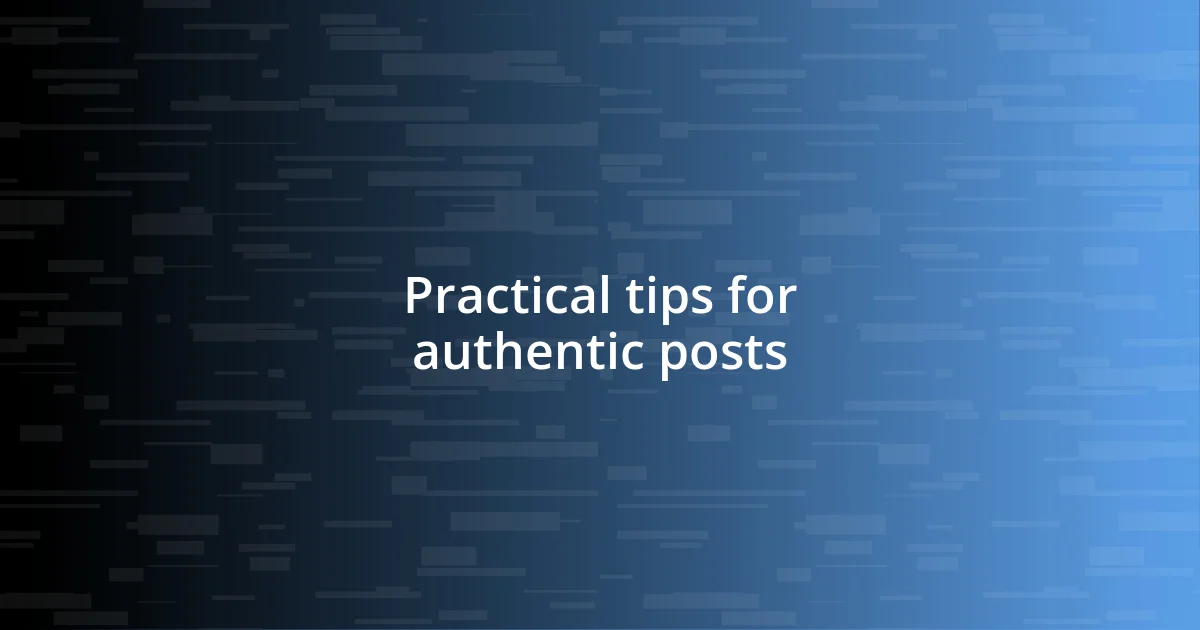
Practical tips for authentic posts
When crafting authentic posts, I often find it helpful to tap into my daily experiences. For instance, I once shared a mundane yet relatable moment—like struggling to get out of bed on a Monday morning. The comments that followed were filled with similar stories, highlighting how connecting over shared struggles can resonate far more than polished perfection.
Another practical tip is to embrace your unique voice. I remember posting a tutorial that intertwined my quirky sense of humor with helpful tips. Surprisingly, it attracted a wave of enthusiasm from my audience. Have you ever thought about how infusing your personality leads to more genuine engagement? Authenticity shines brightest when we allow ourselves to be vulnerable, and people appreciate that rawness.
Finally, consistency matters, but not in the way you might think. I believe it’s more about being consistent in your authenticity rather than sticking rigidly to a posting schedule. I’ve shifted to sharing posts spontaneously when inspiration strikes, and that approach often yields the most heartfelt responses. It’s a reminder that our audience craves real moments over regimented timelines. What about you—what are those spontaneous moments that reflect your true self?
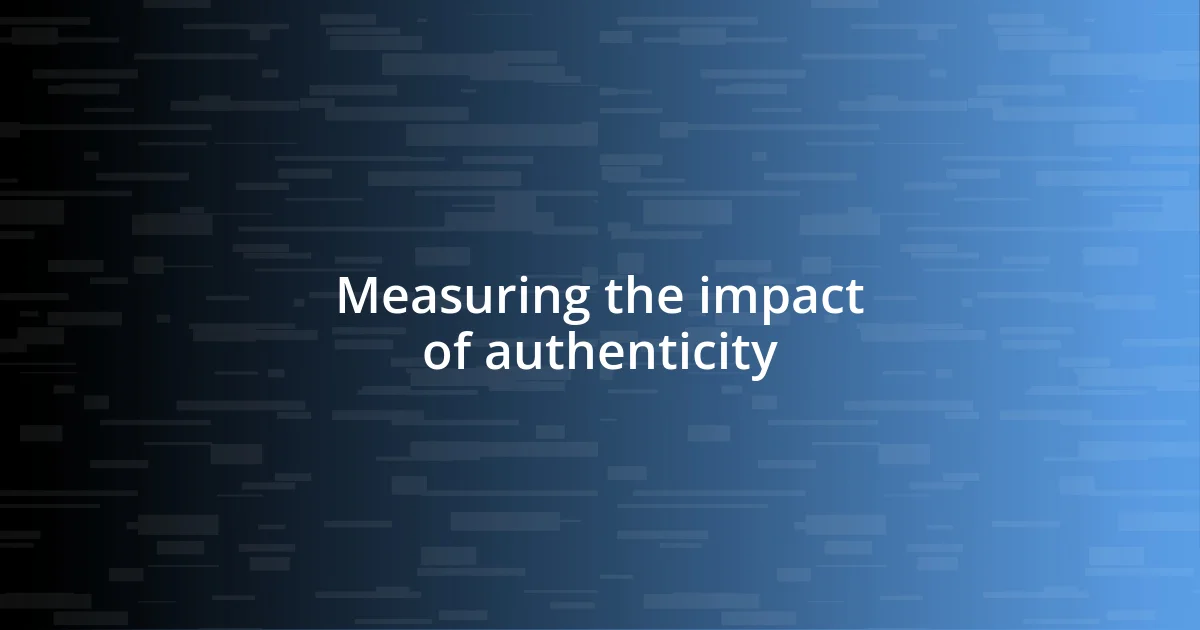
Measuring the impact of authenticity
Measuring the impact of authenticity is more nuanced than it may seem. I often reflect on how certain posts evoke unexpected responses. For instance, I shared a candid photo of my workspace, clutter and all, and it sparked a flood of comments from others also navigating their creative chaos. This reaction made me realize that rawness often resonates more than a polished portrayal.
I also pay attention to engagement metrics. I noticed that posts where I let my guard down receive more likes and shares than those that feel overly curated. It’s like a small light bulb moment when I see that vulnerability fosters connection. Have you ever thought about how your audience might react differently when you share your real self versus a rehearsed version?
Additionally, feedback serves as a valuable measure of authenticity’s impact. I’ve received heartfelt messages from those who felt seen and understood through my more honest posts. It drives home the idea that authenticity isn’t merely a personal journey; it creates a ripple effect, encouraging others to embrace their truth. Isn’t it fascinating to think about how sharing our stories can inspire others to do the same?
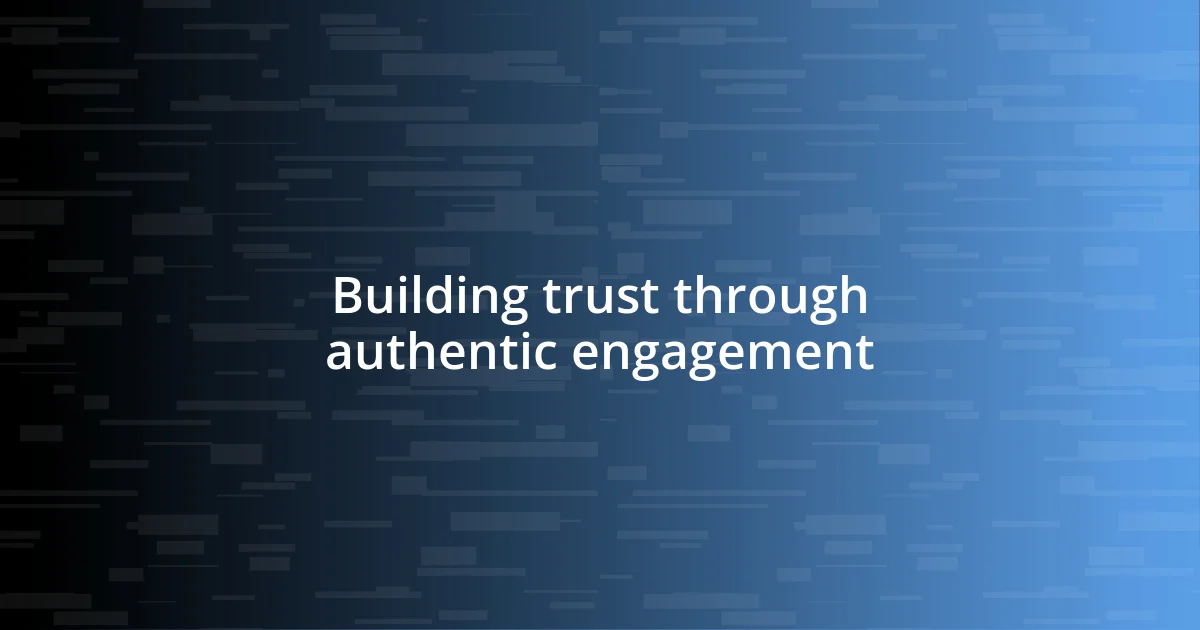
Building trust through authentic engagement
Building trust through authentic engagement is truly transformative. I recall a time when I responded to a follower’s comment with a deeply personal story about my journey. To my surprise, it sparked a real dialogue, with others sharing their own experiences and forming a supportive community. Have you ever felt that sense of camaraderie when someone opens up? It creates an atmosphere where trust can flourish.
Authenticity often invites vulnerability, and I’ve seen people appreciate this approach to engagement. For instance, I once posed a question on a post about my struggles with self-doubt, and the flood of responses was overwhelming. It was heartening to witness how sharing my insecurities resonated with others, making them feel comfortable enough to share their own. This interaction reinforced my belief that when we genuinely open up, we pave the way for deeper connections.
In my experience, the little moments of authenticity can lead to significant trust-building. I remember sharing a behind-the-scenes video of a failed project—an unfiltered perspective on my creative process. Instead of shying away from imperfections, I embraced them, and the feedback was incredible. Isn’t it amazing how acknowledging our flaws can humanize us and foster trust in our relationships?
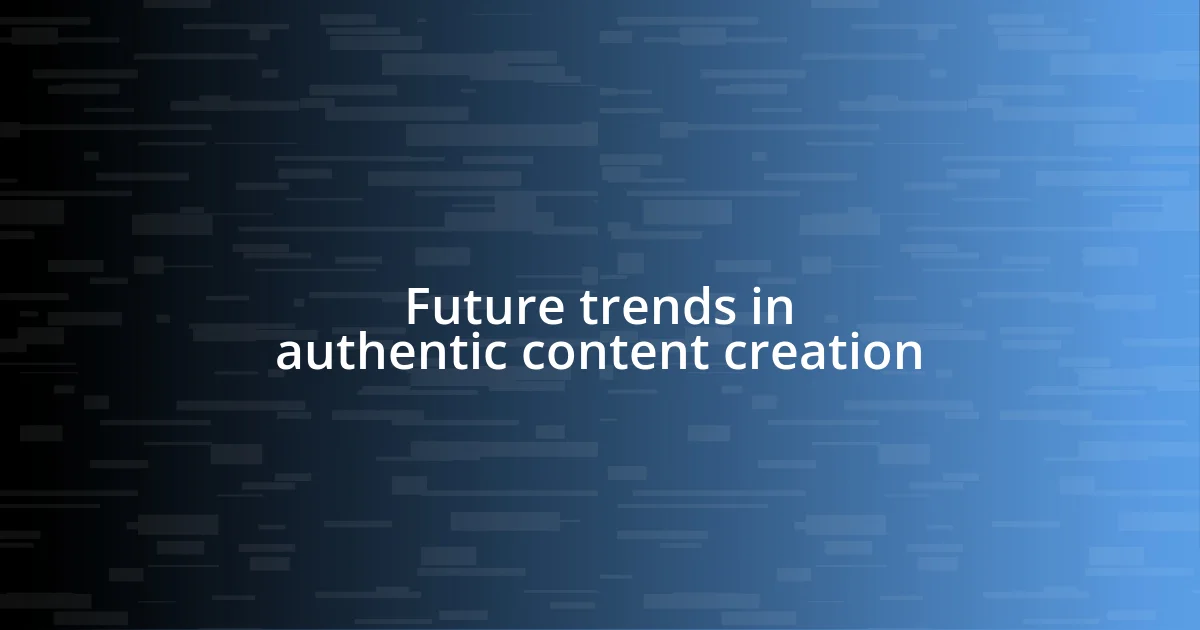
Future trends in authentic content creation
Future trends in authentic content creation are likely to pivot towards increased transparency. I can envision a landscape where creators share more behind-the-scenes content, showing not just the final product but the messy, imperfect journey that leads there. Recently, I experimented with sharing unedited snippets of my brainstorming sessions, and the responses were overwhelmingly positive. It seemed that people appreciated cracking the veneer of perfection that often surrounds creativity. Isn’t it thrilling to think about the stories we can tell when we allow others into our process?
Moreover, I foresee a rise in collaborative authenticity, where communities come together to create content that reflects collective experiences. I once participated in a group project where each contributor shared a personal story around a common theme. The outcome was a rich tapestry of perspectives that resonated more deeply than any single narrative. It made me realize how our unique voices can blend to create something that feels even more authentic. Isn’t it fascinating how collaboration can amplify our individual truths?
Finally, the use of technology in curating genuine connections is on the horizon. With the advent of AI tools, I find myself intrigued by the potential for enhancing authentic engagement while maintaining the human touch. For example, while I’ve used bots for basic interactions, I always follow up personally to add that layer of warmth. There’s something reassuring about knowing a real person is behind the screen, isn’t there? As we move forward, balancing technology with human authenticity will likely be a crucial trend in content creation.












